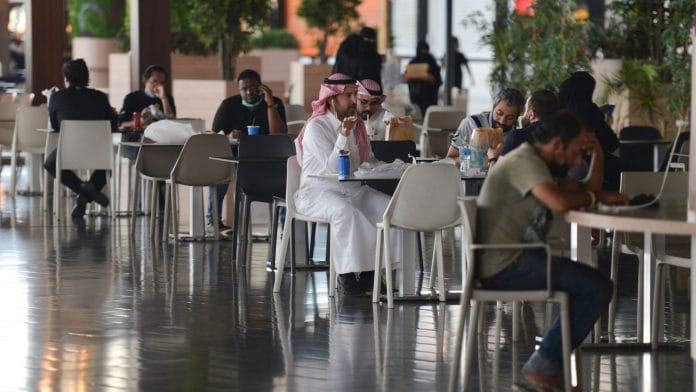Riyadh: The sweltering afternoon in central Riyadh feels much like any other, as traffic snarls past a McDonald’s and men huddle for a smoke outside an office. But the bright red letters on a Health Ministry billboard point to a different reality: “We fear for you!” it warns.
Like the rest of the world, Saudi Arabia is trying to balance public health concerns with economic imperatives. But unlike many countries facing higher case counts after reopening their economies, the kingdom is pushing ahead with normalization just as infections hit all-time highs.
With more than 4,000 new Covid-19 cases a day, the pandemic is surging in Saudi Arabia, and last week it became the 15th country to record 100,000 cases of the disease. Officials have taken to television stations to urge residents to avoid gatherings and wear masks as people get back to work, and have reimposed a lockdown in the coastal city of Jeddah.
The motivation to return to some version of normal is particularly strong in the oil-dependent kingdom, which is facing a double crisis with turmoil in crude markets layered on top of the coronavirus-related slump. Standard Chartered Plc expects gross domestic product to contract 5% this year, with the non-oil sector — the engine of job creation — shrinking for the first time in three decades.
Curfew Ends
As one of the world’s strictest lockdowns is rolled back — an evening curfew is set to end on Sunday in most cities and sports teams can resume training — there are mixed feelings among the 34 million people essentially being asked to live with the virus.
“The cases are rising up — it’s a fact that we need to accept,” said Mamdoh Alanazi, a 31-year-old nurse. Staying home until there’s a vaccine is “not logical anymore,” he said.
Others are concerned as intensive care units fill up and the death rate, still among the lowest in the world at 0.8%, steadily rises.
“When things began to reopen, we started getting more stressed out,” said Noura Abdullah, 32. “We’ve been cooped up for three months, and now you’re telling us we should go out and it’s survival of the fittest?”
Initially it seemed like Saudi Arabia had the outbreak well under control. The government imposed early and strict precautions, including a 24-hour lockdown in April.
As restrictions were loosened in May though, the virus that was until then spreading largely among foreign workers also invaded Saudi homes. As in Italy, it’s finding fertile ground in multi-generational households, where large family gatherings and physical greetings are deeply ingrained customs.
The total number of cases reached 145,991 on Thursday. Medical workers have begun to die and signs around the capital urge passersby: “Don’t be the next statistic.” The government has launched an optional smart-phone application to aid contract tracing.
At a virtual press conference this week, health ministry spokesman Mohammed Al-Abdulaali blamed the rise in cases on poor adherence to precautionary measures. Among new rules are mandatory face masks in public, and worshipers keeping their distance instead of standing shoulder to shoulder in mosques.
‘Additional Measures’
If any region is found to need “intervention or additional measures,” it will get them, Al-Abdulaali said. In Jeddah and Mecca, where the death rate is five times higher than the capital, fewer restrictions have been eased.
Meanwhile in Riyadh, as new cases spiked to a record of more than 2,300 on Wednesday, workers went to their offices and restaurants continued to host diners.
“I feel like we’re back to pre-quarantine era,” said Fahad Khalid, 24, a fresh graduate who’s relieved that his job search has picked up after a lull during the lockdown. “I’m glad that things are back to normal.” – Bloomberg
Also read: Virus affects global cocaine trade, Yemen could see worst outbreak & other Covid news






